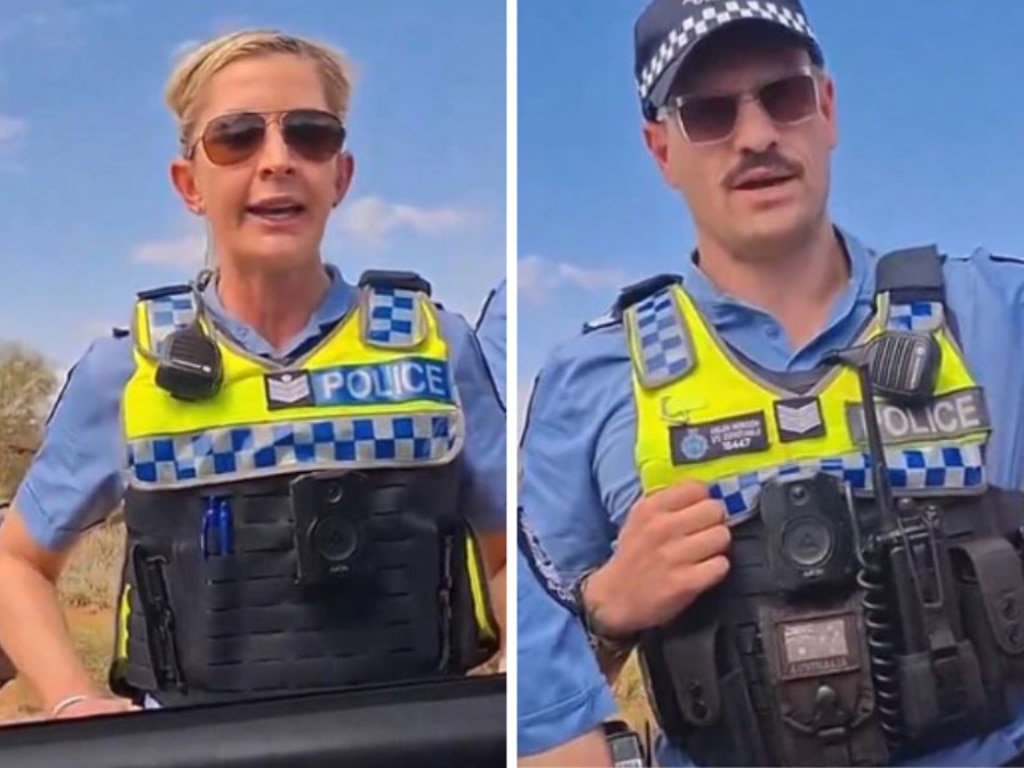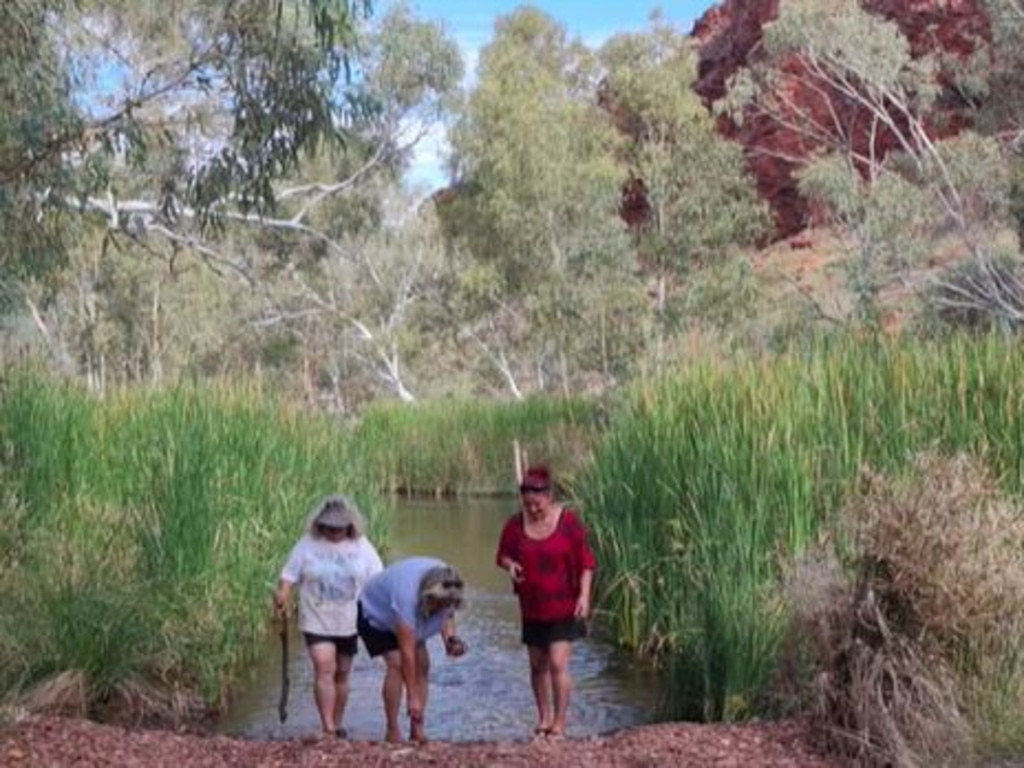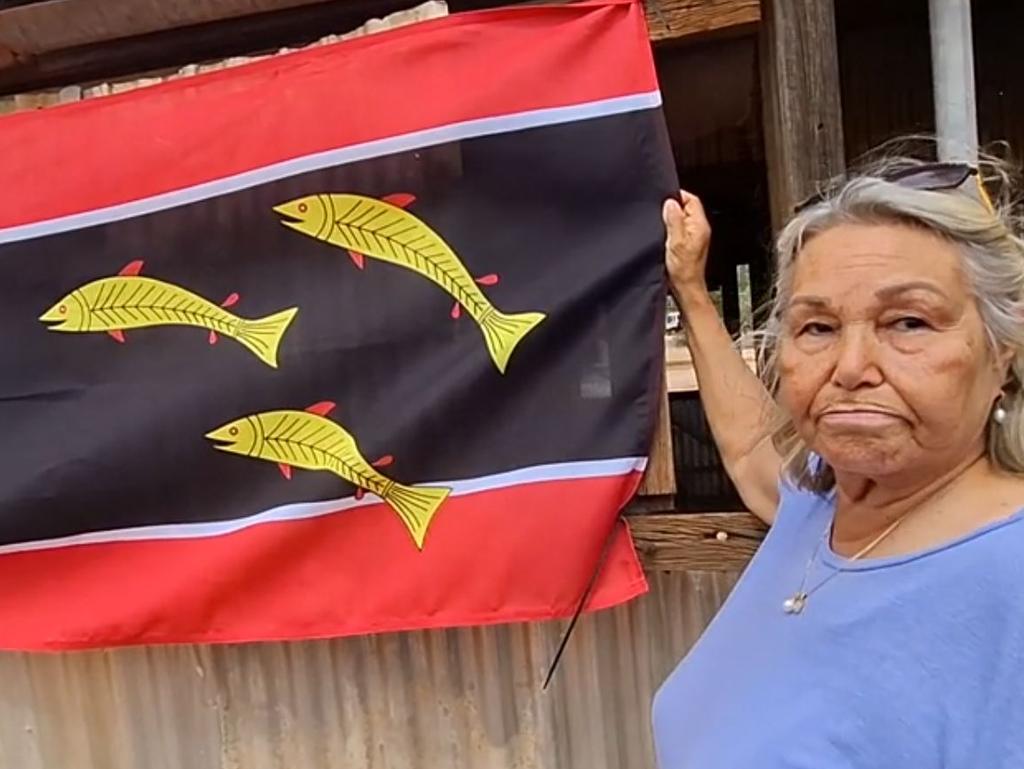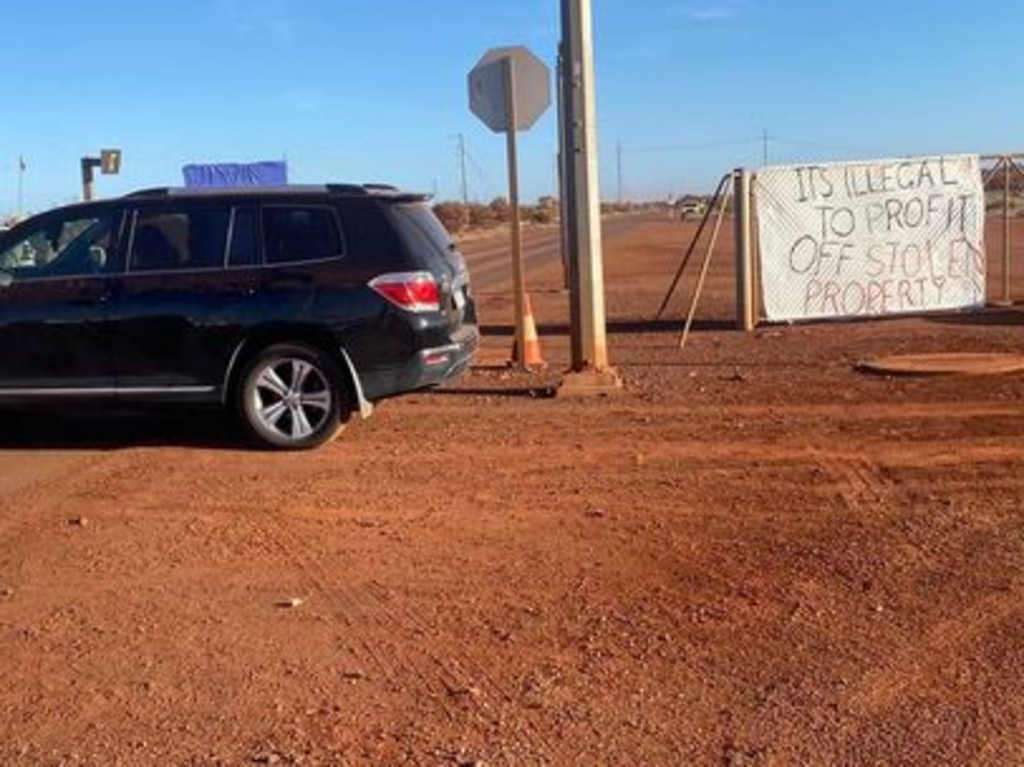Dark twist in clash over pastoral station in Pilbara owned by Gina Rinehart’s mining company
An Indigenous woman clashed with cops after being told she was camping on private land owned by Gina Rinehart’s mining giant. There’s a dark twist to the story.
A heated clash between an Indigenous woman and police on a site owned by Gina Rinehart’s mining company is just the tip of the iceberg in an ugly dispute over who owns the land.
Police were called to a pastoral station, owned by Gina Rinehart’s mining giant Roy Hill, in Western Australia’s remote Pilbara region on October 9.
Footage of the interaction showed a female officer repeatedly asking the woman, who had been camping on the private land for five days with a larger group, to leave.
“It’s now five days after you arrived, I’m asking you to leave. You’re not being very polite,” the officer said.
“I’m asking you very nicely please pack up your stuff and leave.”
Police told news.com.au the group eventually left the area “without incident.”
In a twist to the story, it’s understood the woman who was filmed challenging police over her right to camp on the land is part of the Wunna Nyiyaparli Indigenous Peoples.
In 2012, the mob’s native title claim for the mineral-rich region – seeking the rights “to manage, conserve and look after the land” - was rejected by the Federal Court.

The group were struck out of the legal action after struggling to find legal aid and the Federal Court instead granted a native title claim to a larger cultural bloc known as the Nyiyaparli People.
Wunna Nyiyaparli then took their dispute to the United Nations Human Rights Committee, which in 2023 found Australia had breached their cultural rights with the process.
The Committee urged the Australian Government to pay the group “adequate compensation for the harm they have suffered” and “review any mining concessions granted over the traditional lands” without their consent.
Charles Sturt University legal academic Scott Calnan, who represented the group, said his clients believed “their ancestors are buried on that ground” and had a “duty to protect the sacred sites.”
“They’re actually really upset that mining operations on the land are destroying sacred sites, including marshes,” he told AAP in January.
“There are lots of Indigenous people who want to know their claims to native title are being dealt with fairly by a fair procedure.
“That’s all the UN decision, basically, is about: that, if you go to an Australian court claiming native title, you should have a fair procedure, you should be able to get enough legal aid so you can put your case.”

Now, pressure is on the Australian government to respond to the non-binding ruling from the UN Committee.
A spokesperson for the Attorney-General’s office told news.com.au the Australian Government had provided its response to the Committee’s views.
It’s unclear when their response, which the spokesperson said would be published online “in due course”, will be released.
A response was expected in February 2024.
Wunna Nyiyaparli woman hits back
Ailsa Roy, a registered nurse who represented the Wunna Nyiyaparli community in their submission to the UN, spoke about her connection to the region in a series of TikTok clips.
“This fish represents the Fortescue Marsh … the marsh is sacred to this area and to our people,” Ms Roy said while holding up a cultural flag.
“The white represents the forest gums, black is for our people and for our dark history, and red is for the sacred grounds at Roy Hill.”

In a separate video she said her relatives were “direct descendants of William Coffin” – a man who was born at Roy Hill Station in 1903 and is a central piece of their ancestral claim to the land.
“In honour of our fathers our mothers and our grandfathers, we share their stories … their legacy recorded for their children,” Ms Roy said.
“Sadly many of our elders who were denied their country, their birthright and their identity and history have since passed.”
Ms Roy said William Coffin had two surviving daughters and “many grandchildren and great-grandchildren who have fond memories of growing up him.”
“They speak proudly of their elder’s strength and endurance as they reminisce about their shared stories of Roy Hill and surrounding areas,” she continued.
“They spoke the high language… which came from this area. They were respected gentlemen as well as strong … cultural leaders.
“The fact that we’re standing here is a testament to their legacy.”

Group demands sit-down with Gina, blocks mine entrance
The Wunna Nyiyaparli staged a protest against Roy Hill in 2022, blocking the main entrance to the mine site in East Pilbara and demanding a sit-down with Ms Rinehart.
“We have three cars blocking the entrance,” Ms Roy told Ngaarda Media.
”They’ve detoured all their trucks to another access road which we’ll block when other people get here.”
Ms Roy said sacred sites had been desecrated by the mine work.
“Gina Rinehart does not have authority to be here on Roy Hill. We can prove that, but she refuses to have a meeting with us, so that’s why we’re here.”
Roy Hill provided food and water to the protesters but defended its relationships with traditional owner groups.
“It is believed the group are disputing a 2018 Federal Court decision to award Native Title to an area of land which includes some of the Roy Hill operations and a number of other companies’ mining operations,” a spokesperson told Ngaarda at the time.
Mining giant’s native title agreements
Roy Hill has native title agreements with four separate groups - the Kariyarra, Palyku, Nyiyaparli and Nyamal people - in order to operate in the Pilbara region.
“These agreements distribute significant royalties to each group as well as other agreed investments,” the mining giant, which is 80 per cent owned by Ms Rinehart, says on its website.
“We have very strong collaborative relationships with all the Groups. We are very proud of these relationships and meet both formally and informally,” the miner adds.
news.com.au has contacted the Karlka Nyiyaparli Aboriginal Corporation, the native title holders for the pastoral lease in question, for further comment.




